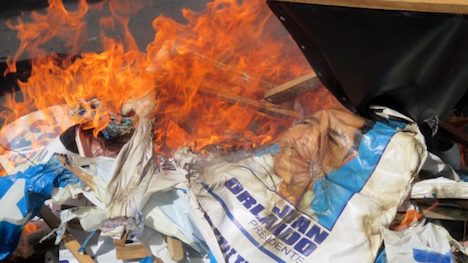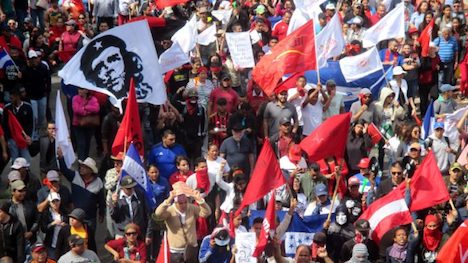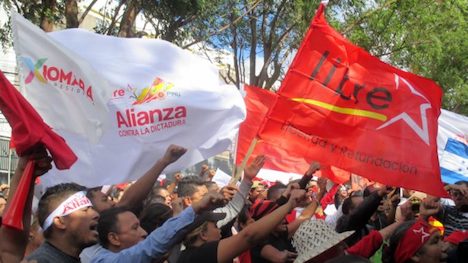Made in the USA: The Honduran Political Crisis, Rebooted
 Print This Print This
By Sandra Cuffe | Toward Freedom
Toward Freedom
Sunday, Dec 17, 2017
 |
| Campaign materials for the reelection of Honduran president Juan Orlando Hernández burn in a bonfire outside the US Embassy in Tegucigalpa. Photo by Sandra Cuffe |
“The electoral tribunal plans to steal the presidency away from us,” said National Front of Popular Resistance coordinator Juan Barahona, raising his voice to be heard over the cacophony of chants and vuvuzelas at a march against electoral fraud in Tegucigalpa, the Honduran capital. “We’re not going to abandon the streets,” he told Toward Freedom.
The crisis in Honduras is escalating. More than two weeks after general elections, the country is still without a president-elect. Nationwide marches, highway blockades, and neighborhood and community rallies continue to pop up around the country. As evidence of electoral fraud mounts, so does attention to the US role in the crisis.
Hondurans cast their ballots on November 26. Opposition Alliance Against the Dictatorship presidential candidate Salvador Nasralla had a stable five-point lead over incumbent Juan Orlando Hernández until the electoral tribunal’s data transmission system went down. When it came back online, the remaining results being transmitted were suddenly so overwhelmingly in Hernández’ favor that he overtook Nasralla. The process was also marred by further delays and system failures, as well as by allegations of number inflation, document falsification, and political party credential trafficking.
“The practice of the Supreme Electoral Tribunal has been so shameless that even the European Union and OAS observation missions have had to recognize the irregularities,” said Ismael Moreno, director of the Reflection, Research and Communication Team (ERIC) and Radio Progreso.
Moreno doesn’t think the election observation missions would have necessarily flagged anything on their own. People inside the Supreme Electoral Tribunal – most notably tribunal magistrate Marco Ramiro Lobo – raised alarm. So did the opposition alliance, reporting discrepancies and fraud. Finally, public pressure was mounting in the streets. It was a combination of all three things that did it, Moreno told Toward Freedom.
“That, in my view, is what has led the OAS mission and the European Union mission to finally admit these so-called ‘irregularities,’ which is effectively admitting fraud,” he said.
The OAS electoral observation mission refused to validate the electoral tribunal’s results and presented a series of recommendations. “The Mission observed with concern the stage of processing of votes and dissemination of results,” the mission wrote in a December 4 statement. “The tight margin of the results, and the irregularities, errors and systemic problems that have surrounded this election do not allow the Mission to hold certainty about the results.”
 |
| Thousands of Hondurans took to the streets of Tegucigalpa on December 10 to protest electoral fraud and US interference. Photo by Sandra Cuffe |
The United States, on the other hand, has largely been downplaying the situation. Following other statements made by the US State Department and the US Embassy in Tegucigalpa, the embassy’s chargé d’affaires Heide Fulton acknowledged in a December 7 statement that the OAS and European Union missions’ preliminary reports “described some irregularities in the November 26 election process in Honduras.” However, in statements in the ensuing few days, Fulton praised the electoral tribunal’s transparency during a widely criticized partial recount and stated that the US looks forward to working with the winner.
Fulton’s statements and appearances inside the facilities used by the electoral tribunal have not gone unnoticed. A thousands-strong mobilization against electoral fraud on December 10 in Tegucigalpa marched to the US Embassy to protest the US role in the ongoing crisis. One day earlier, opposition alliance coordinator Manuel Zelaya, the former president who was ousted in a 2009 coup d’état, criticized Fulton in a public letter.
“Over these past 48 hours, she has dedicated herself to endorsing the spurious vote-by-vote recount of (4,753) fraudulent ballot boxes corresponding to vote tally sheets that the whole Honduran population knows perfectly well have been doctored to favor the National Party’s illegal candidate,” Zelaya wrote.
The letter condemned US interference and attempts to divide the opposition alliance. According to Zelaya, OAS representatives have recommended that Nasralla “completely disassociate himself from ex president Zelaya because he is a Chavista and touts democratic socialism.”
The Honduran government has also been recycling its post-coup claims that Zelaya is in league with Venezuela. At the beginning of this month, amid opposition protests and roadblocks, Ebal Díaz, Secretary of the Council of Ministers, said that Zelaya and protests were being financed by “a South American country.” The claims were then repeated by a US public relations firm on behalf of the Honduran government. They also alleged Zelaya and Nasralla have a pact with gang members.
The claims are far from the only coup-related issue to resurface eight years later. Zelaya was illegally detained and forcibly expatriated by Honduran armed forces on June 28, 2009. A non-binding poll was to have taken place that day, asking Hondurans if they wanted a Constitutional Assembly. An actual binding referendum wouldn’t have taken place until the next scheduled elections, and any potential new Constitution wouldn’t have been written until after Zelaya was out of power.
Regardless, the public justification for the 2009 coup – one that is still to this day sometimes repeated in the press in the US – is that Zelaya was seeking a second term. The Constitution of Honduras has a strict one-term limit as part of its core articles that are set in stone and cannot be altered even by the two thirds majority in Congress required for other Constitutional reforms. It is treason to violate the term limit, according to the Constitution.
However, the National Party has been concentrating power, particularly in the executive branch, since coming to power in 2010 in the wake of the coup. In 2012, the party carried out a sort of technical coup against the judiciary, with Congress – with Hernández at its helm – illegally ousting and replacing magistrates from the Constitutional Chamber of the Supreme Court of Justice. In 2015, after Hernández had taken office as president, the Supreme Court ruled on the issue of term limits, essentially declaring the restriction on reelection inapplicable. The Supreme Court, however, does not have the faculty to reinterpret or otherwise alter the ban on reelection, but the judiciary – like the Supreme Electoral Tribunal – is controlled by the National Party under Hernández. Despite the ruling, reelection is just as unconstitutional now as it was when it was used as an excuse to oust Zelaya.
That’s why even the welcome concerns of the OAS and European Union electoral observation missions remind Moreno that in some ways it’s too little, too late.
“In general over the last three years, I think that the international community – the United States government, the OAS, the UN, and the European Union – have had a history of endorsing the decisions Juan Orlando Hernández has made on the road to reelection,” said Moreno. “They all know full well that the candidacy of Juan Orlando Hernández has no legal basis.”
 |
|
Opposition alliance supporters sing the national anthem outside the US Embassy in Tegucigalpa at the end of a December 10 march against electoral fraud. Photo by Sandra Cuffe |
Contrary to the US government’s position when altering or lifting presidential term limits has come up in Venezuela and other Latin American countries, there was no objection when it came to the US’s right-wing ally in Honduras.
“The U.S. Government does not oppose President Hernández or others from presenting themselves for re-election according to Honduran democratic processess. It is up to the Honduran people to determine their political future through their democratic institutions and processes,” according to a November 7, 2016 statement by the US Embassy in Honduras.
The ability of the Honduran people to determine their political future is clearly now in jeopardy, but the US made sure to greenlight assistance to state security forces just in time. On November 28, two days after the elections, the US State Department certified that Honduras was making process on issues of human rights and corruption, freeing up millions of dollars in security aid.
In the week following the certification, at least 14 people were killed in the context of the electoral crisis, nearly all of them by security forces cracking down on protests. The government declared a 10-day state of exception on December 1, implementing a curfew that was initially from 6pm to 6am nationwide and then gradually eased to 10pm to 5am in certain parts of the country. Also in the week following the certification, dozens of people were injured – including minors with gunshot wounds inflicted by security forces – and hundreds of people were detained, according to the Committee of Relatives of the Detained-Disappeared in Honduras (COFADEH).
“The government of the United States isn’t unaware of what’s going on,” COFADEH co-founder and coordinator Bertha Oliva told Toward Freedom.
“If the United States is declaring that Honduras is a country that’s advancing in the implementation of respect for human rights, and the Embassy is also considering it a success and congratulating the Supreme Electoral Tribunal for actions of transparency in the recount of these latest vote tally sheets, it seems to me they’re totally endorsing the continuation of the dictatorship,” she said.
Between the recounts, legal challenges, popular pressure, and whatever behind-the-scenes political maneuvers are taking place, it’s impossible to know exactly what will come next or when. However, both Oliva and Moreno do foresee the electoral tribunal declaring Hernández the next president-elect of Honduras, and Moreno holds the US responsible for the explosion of unrest that will undoubtedly ensue.
“The silence and the collusion of the US Embassy in Honduras with regard to the electoral fraud makes the US Embassy the ultimate authority responsible of the consequences that will ensue once the Supreme Electoral Tribunal makes an official declaration recognizing Juan Orlando Hernández as president-elect,” said Moreno.
The consequences would likely involve more militarization and repression. As Honduras enters its third week since the elections with no clear end in sight, many Hondurans hope the world won’t turn away from what is going on in their Central American country. Moreno hopes people in the US get the message that they also need to hold their government accountable.
“I would like organizations in the United States to know that, so they can also identify the collusion of the US Embassy in human rights violations and electoral fraud here in the Republic of Honduras,” he said.
|
 Print This Print This

|

